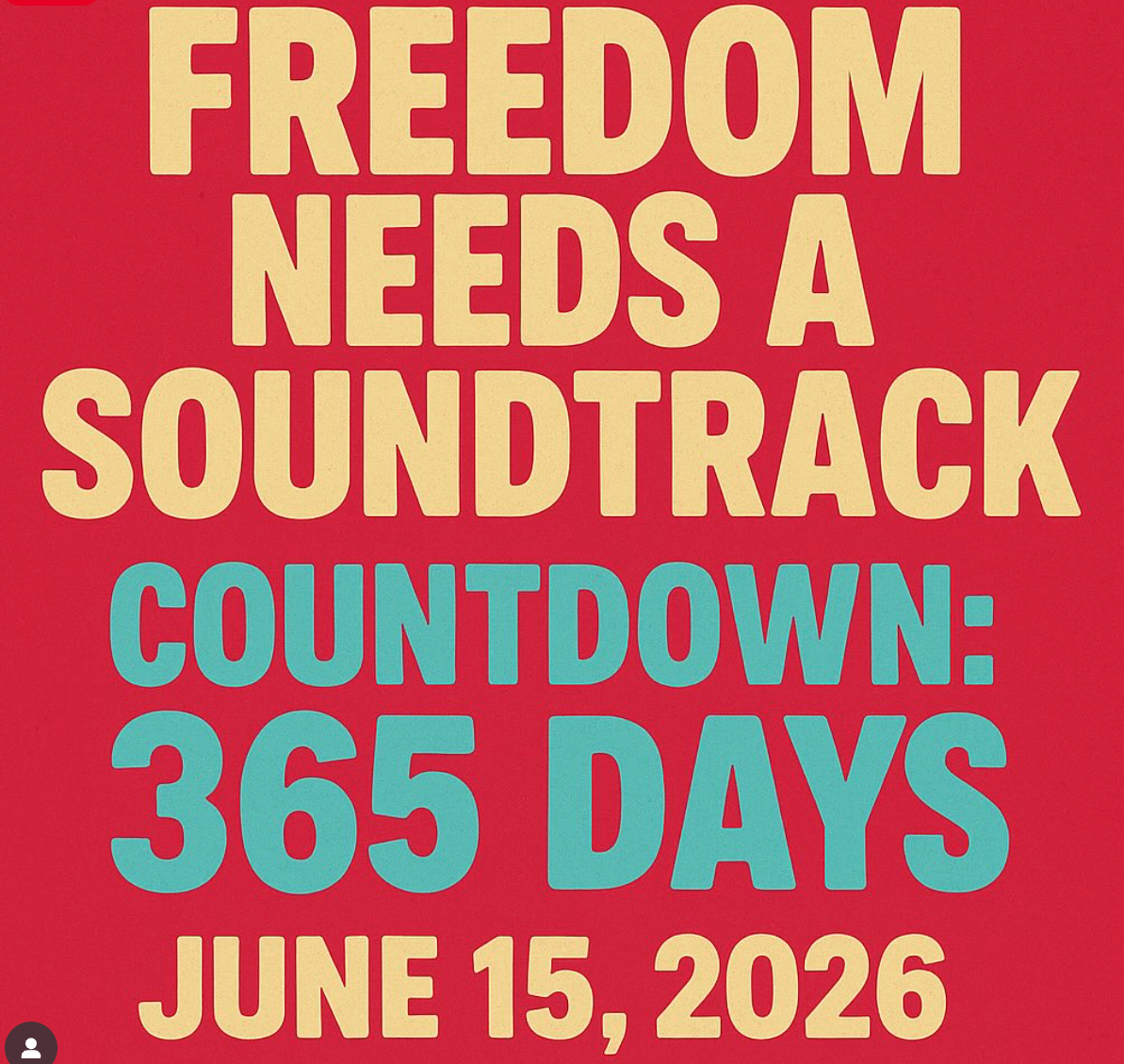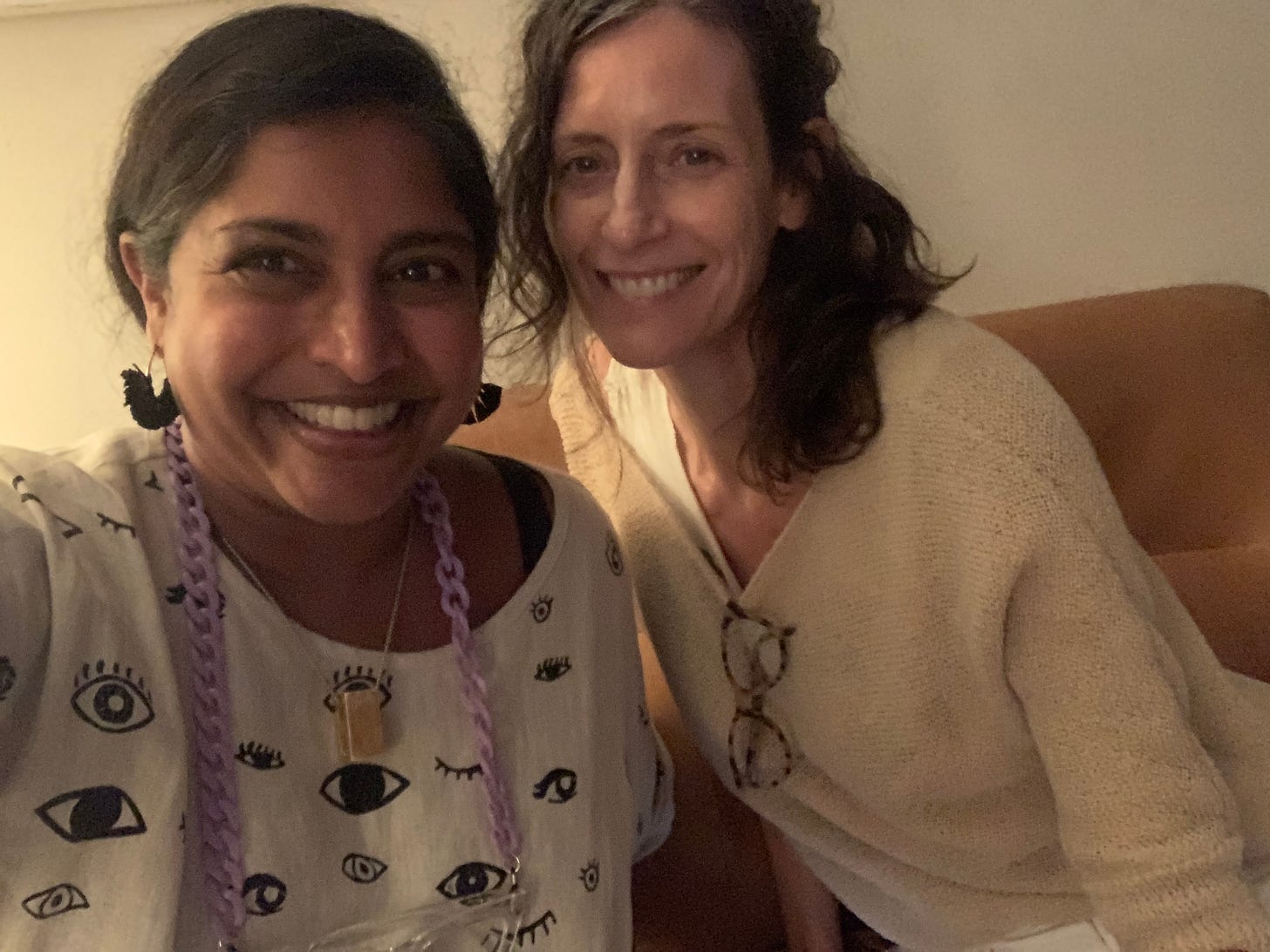Since starting Practice Practice, most of my “engagement” is happening off Substack - in long WhatsApp chats with friends in other parts of the world, email responses that turn into treatises. In general, I find it a lot easier to respond to an email than to write a newsletter post, so I thought I would start a series in which I just copy and paste one of my own emails. Below is a condensed and very lightly edited version of a back and forth I had with a colleague and friend - Erin Potts - who wrote to me with some questions about starting a creative practice. She and I are on similar paths as we work to integrate creativity more deeply into our lives, and I share her questions with her permission.
Erin is a pioneering social change strategist - the co-founder of the Milarepa Fund, the Tibetan Freedom Concerts, and Revolutions Per Minute. She is producing and hosting a podcast to take listeners behind the scenes of the groundbreaking Tibetan Freedom Concerts and the movement for a Free Tibet. The weekly podcast - Freedom Needs a Soundtrack - will launch on June 15, 2026, the 30th anniversary of the first concert.
Erin: How do you think about maximizing your impact as a creative, especially as it relates to making the transition from activist to creative?
Christie: I think there are as many different ways to think about how to be a creative as there are creatives. For example, I’ve met creatives who are trying to maximize impact, but for better or worse, I am trying to do something else, at least in this phase of my creative journey. So I am partly answering your question directly but also partly using it as a prompt to explore my own practice/push my thinking. Maybe by the time we hop on the phone, I won't even agree with what I've written below.
At the beginning of my project, I wasn't thinking about audience at all. Or, perhaps better said, the audience I was optimizing for was myself and what I liked, what felt good, what sounded good, my own delight. That is probably also because of the nature of the specific project I was working on, which was essentially a glorified Cliffs notes / journal - who else would be interested in such a thing besides me (and maybe my partner Colin)?
I have now come to think that making something for yourself is actually a great organizing principle - you don't get hung up on how things sound/how they will be received because you're not worried about what anyone else will think/what impact it might have. I think that "minimizing" impact - focusing on the smallest feeling of joy or delight is actually great.
One other challenge that occurs to me about the transition from professional activist to creative is a feeling of guilt you might have over not maximizing your impact, a fear about creative work being self-indulgent. I don't even subscribe to this framing anymore, but I do think it's a real and understandable feeling.
Erin: How have you navigated creative collaborations?
Christie: Collaboration has really ranged from effortless and magical to a lot of effort with a kind of small result, but I have been open to all of it. Only recently have I decided I need to be more targeted/efficient with my collaborations. And you are correct that collaboration has kind of become the project. This question is probably easiest discussed, so I'll just include some examples and notes here.
Because my book report wasn't a commissioned project (ie, I didn't have an editor or publisher, etc), I needed to kind of organize my own collaborators. I joined a writing group that gave me people I could run things by without having to explain much. One of the people in my group edited the whole book, another one helped me redesign some of the pages, another one rewrote some of the descriptive copy.
Then there was the actual "making" of the book. I had to throw money at this problem. The book was handmade in part because that was the point of the project but also because I didn't have technical skills to make it any other way. The whole thing would have gone a lot faster if I had just made it digitally. When it came time to properly digitize the 200+ pages, I realized I had hit the wall in terms of what I could do on my own and what I could ask my friends to do for free. Eventually, this was design work I had to find and pay for.
Finding someone to do this took forever and was a very frustrating process. Eventually, I found the absolute perfect person (who was perfect partly because she had never done it before and therefore was willing to work with my budget), but it also meant there were lots of avoidable mistakes we made along the way. The mistakes part doesn’t really matter because the best outcome of our collaboration is that we became friends. So stay open, stay patient.
This is also to say that part of the process of collaboration in my experience is about money - people don't talk about this very much. I was able to make my project happen because I didn't need money from it or in order to work on it and also I was willing to spend money in order to make it the way I wanted to. There is/will be a limit to this; in fact, I'm probably right now up against my own limits in terms of how much more of my own money I can spend on this thing.
Some other kinds of collaboration:
unexpected ones - this person who was supposed to make editorial comments on my book report and then wrote me a 17-page book report
annoying ones - people who have very sweetly offered to help but neither of us is sure what that means exactly, and then they get busy or their bandwidth changes, and I end up sending dreaded “just checking in again” emails; it’s all part of the process
formalized ones - I'm experimenting now with a barter collaboration - I am advising an organization and in return they are supporting me on getting the project out in the world
Last point: if your collaborations are more about your own projects, you are the one who is going to be doing the vast majority of the work (as it should be). There are exceptions to this, of course. But mostly no one else has the time or energy to care about your stuff the way you do. Unless it's someone’s job in some way, most of the hustle will be up to you.
Erin: You posted something about the importance of making your creative practice public. Can you talk more about that? It’s a pretty exciting and nerve-wracking part of what I’m trying to do.
Christie: Totally nerve-wracking, totally exciting. The first 3 years of my project were private - just me in my shed tinkering away. I started to share it with people as a way to get feedback, and the experience of getting feedback from Elizabeth was so moving/gratifying/generative that I understood in a completely different way the importance of making the work public. It's become a virtuous circle, flywheel kind of thing. I am not naturally inclined this way, but in general, it has been so rewarding that I keep forcing myself to do it. I’m working with the garage door up because "working on niche, personally-meaningful projects brings weirder, more serendipitous inbounds."
For example, you and I probably wouldn't be emailing were it not for me making the work more public. I have so many different examples of people I am in touch with that I wouldn't be were it not for pushing myself in this direction. So I’m going to keep doing it.
Erin: Are you making a living from your creative practice? I know that you have applied and gotten grants and residencies and such, but that never seems to be sustainable nor enough. How do we handle the financial part of our lives as we are trying to focus on our creative life more? Any advice? Should I just make money elsewhere and do the creative outside of the need to pay the bills?
Christie: To your first question, absolutely not. Not even close. Not tracking it super well. Because the biggest expense is my time, by that metric, I am almost certainly losing money. But at least up until now, I haven't cared because it's been so satisfying. I should also say that my goal was not to make a living from my creative practice. I still advise foundations and family offices as my paid work.
I haven't received any grants for the project. I just decided to pay for it myself because I wanted it to exist. There is a lot of freedom and privilege in that. I also believe that I could have wasted years applying and waiting for some gatekeeper to decide my project was worthy instead of just doing the project. You are so well connected philanthropically - especially in the cultural space - that you probably could get your creative projects funded. In my case, even though I am connected philanthropically, my project was so idiosyncratic and personal, it's not particularly fundable - particularly as it was first conceived and realized.
Right now there are offshoots of the project that I think could/should be bankrolled externally, and I am trying to work on that. We'll see. I still go back to the idea of just making what I want to see in the world and doing it in a scrappy way if I can't get someone to underwrite it. I think I could easily crowdfund some of these things, but as you know, crowdfunding campaigns are also a lot of time/effort. Effort that could be spent just doing what I want to do.
I think it's important to talk about the money aspects. I like keeping my creativity as an expensive hobby. For a certain kind of person who doesn't understand why I'm doing all this when it takes so much time and costs me money, I liken it to golf.
Erin: You seem to have created an amazing community around your practice (it’s almost like community is the creative practice sometimes). Can you talk more about why that is important to you, how you did it, what you are learning from it, etc.?
Christie: This is the most interesting, exciting, fun, generative part of the project. The reason I keep doing it is mostly selfish and a little bit selfless. It is interesting, exciting, fun and generative ... for me. That it also often helps other people is also very very satisfying and rewarding. But I don't think I would keep iterating on this aspect of it if it wasn't also feeding me.
There's lots more to say about this, but I've gotten tired of typing, and i'm also realizing this will be exhausting to read and it's probably a lot easier to just chat about all this, but it was nice for me to take some time to reflect on all this. I can’t wait to hear about your projects.





